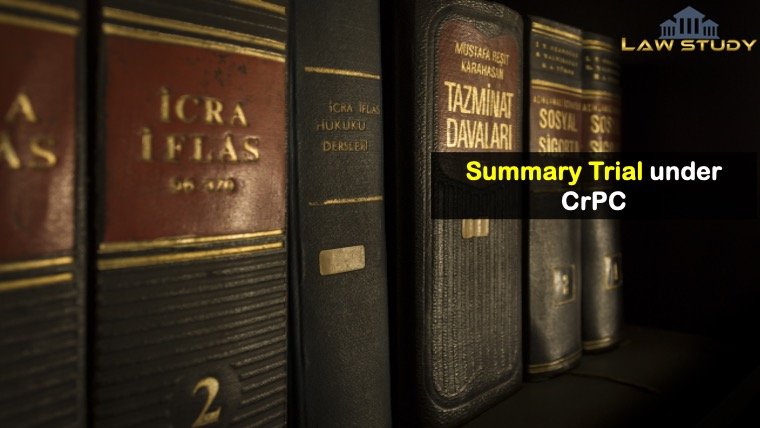Introduction of the Summary Trial under CrPC: – Summary trials are trials that are conducted rapidly and with a streamlined procedure for recording the trials. The summary trial principle is mainly based on the legal maxim ‘justice delayed, justice denied.’ It is significant to mention that the summary appears only in the proceedings record and not in the execution of the court proceedings. In all matters, the proceedings must be handled with care & caution.
Summary Trial
A summary hearing means the matter will be heard and dismissed immediately. Cases that are complex and need a lengthy investigation procedure are not eligible for such a hearing. Even in minor matters, having access to a summary trial saves a miscarriage of justice that might otherwise take years to complete.
The provisions with regard to summary hearings are provided in sec 260 to 265 of Cr.P.C. 1973
The types of offenses that can be prosecuted in a summary trial are listed below. The categories of matters that can be heard by first-class & second-class magistrates are described in sec. S.261 & S.262, respectively.
chief magistrate, metropolitan magistrate, or first-class magistrate
Following cases may be heard before a chief magistrate, metropolitan magistrate, or first-class magistrate
- Offenses that are not punishable by the death sentence, life imprisonment, or a term of more than 2 years in jail.
- Theft is covered by sec. 379, 380, & 381 of the IPC as long as the stolen item is worth less than 200 rupees.
- Sec. 411 of IPC prohibits the receipt or retention of stolen items worth less than 200 rupees.
- Assist in the concealing of stolen items under the IPC’s Section 414 under 200 rupees.
- Poor, trespassing on private property in violation of Sec 454 of the IPC.
Sections 506 & 504 of the IPC, respectively, prohibit criminal harassment and insult intending to provoke. One of the above offenses will also be prevented in a summary trial.
If the Supreme Court grants permission, second-class magistrates may be tried for the following offenses;
- Offenses punishable by imprisonment for less than six months.
- Violations that could lead to monetary penalties.
- Termination or attempted commission of the aforementioned offences.
In a summary trial, what procedure is followed?
According to Sec 262 of the CrPC, a summary procedure will follow the same procedure as a much less formal subpoena hearing.
As a result, the procedures for a summary hearing can be stated as follows:
The filing of an FIR & the subsequent investigation
An FIR is filed as the initial step in any criminal case, following which the allegations in the FIR are properly investigated and evidence is gathered. After the investigation, a police report is submitted.
Before the Magistrate
The accused is produced before a magistrate or appears in court, and the specifics of the offenses must be communicated to the suspect clearly and concisely. Charges are not written down in summary or subpoena hearings.
Plea
The accused may plead guilty or not guilty.
Infringement/Violation of plea case
The magistrate records the accused’s statement, and the magistrate can find him or her guilty at his or her discretion.
If the defendant fails to appear before the magistrate to enter a plea of guilty, he must provide Rs.1000 rupees in addition to a letter stating his conviction.
Purushottam Sabra v. State of Orissa, 1992
The court declared, that an accused can’t be convicted and sentenced by a magistrate just because he or she pleads guilty and the prosecution report doesn’t offer any offenses committed by the accused under any legislation.
Plead not guilty
The hearing is the next stage in this case. The magistrate heard both the prosecution and the defendant. He is also investigating all of the case’s witnesses.
Judgment
The accused can be found guilty or acquitted. the magistrate will issue an acquittal order. The accused, on the other hand, can be found guilty and penalized.
D.M. Seth v. Ganeshnarayan R. Podar, 1993,
The court determined that if there are no legitimate reasons to make an accusation, the presiding judge may order that the accused fully compensate the prosecutor following the magistrate’s appeal that the prosecutor demonstrates causation for such a false accusation.
Sentence in summary trial proceedings
A convicted person in a summary trial cannot be punished for more than 3 months in prison.
Judgment
The Magistrate’s judgment in circumstances when the accused does not plead guilty will simply include the foregoing, according to Sec. 264 of the CrPC.
The evidence’s relevant content.
Explain briefly why the magistrate came to such a conclusion.
Under Sec. 263 of the CrPC,
The following information must be recorded in each summary:
- The case serial number.
- The time & date when the offence occurred.
- The complaint’s filing date.
- The names of the parents.
- The accused’s name & address.
- The infringement as well as the monetary amount of the stolen goods.
- It’s the accused’s plea, and if he’s being examined & investigated, so is it.
- The findings of the Magistrate.
- The magistrate’s decision or final order.
- The end date of the legal action.
Conclusion
The purpose of a summary trial is to eliminate unnecessary obstruction by a defendant who does not have a defense and to reach a speedy conclusion promptly. Summary hearings are conducted in Rule 1, The Supreme Court, Civil City Courts, and Small Business Courts. It can also be presented in other courts. Conversely, the Supreme Court may limit the kind of complaints that can be heard by the court by publishing a notice in the Official Gazette.

























